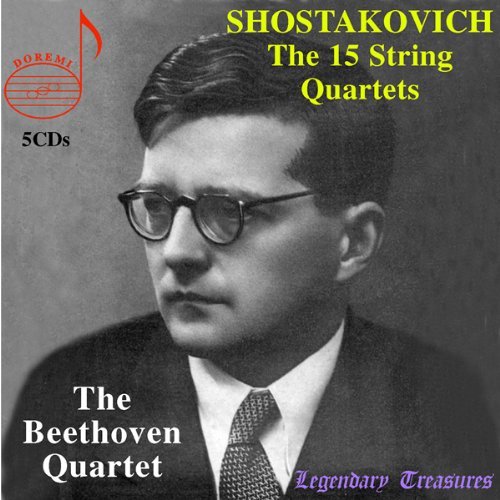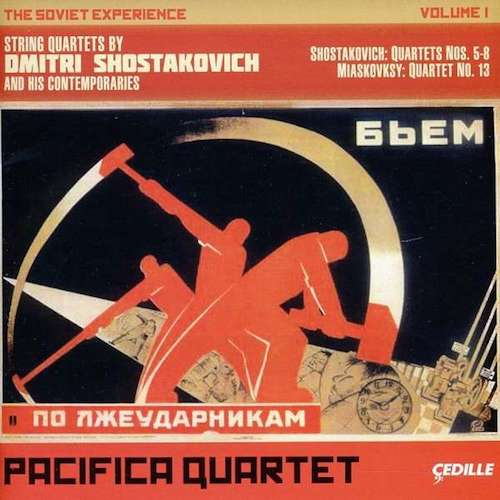
The Beethoven Quartet
Recorded 1956-74
Remastering and Restoration: Jacob Harnoy
DOREMI DHR-7911-5 (5 CDs)

Shostakovich: String Quartets (complete) and quartets by Miaskovsky, Prokofiev, Weinberg and Schnittke
Pacifica Quartet
Cedille 1003 (8 CDs)
Here we have two complete cycles of the 15 Shostakovich string quartets. How to choose between them? Actually, anyone seriously interested in this music needs have both of them.
The Beethoven Quartet cycle is practically self-recommending. The original members of the quartet worked together for the first time in 1923 as the Moscow Conservatory Quartet and regularly thereafter into the 1970s. As the Beethoven Quartet this great Soviet ensemble worked closely with Shostakovich for most of his life and gave the premieres of most of his quartets. The details of the relationship between Shostakovich and the Beethoven Quartet are well told by producer Jacob Harnoy in his liner notes. He quotes first violinist Dimitry Tsyganov on the subject of how they went about preparing the composer’s new quartets:
First Shostakovich would play his new work on the piano from the score. Then he
would give us the parts and beg us not to begin playing without him. He needed
rehearsals not in order to test his new opus, and still less to change any of its details.
He needed them in order to make the performers grasp his idea of the actual sound
of the music. Our interpretations were authorized by Dimitri Shostakovich.
The 15 Shostakovich string quartets rank with the greatest works ever composed for this combination of instruments. Beethoven’s 16 quartets will likely always have pride of place for both quality and quantity but Shostakovich is not far behind.
These recordings by the Beethoven Quartet were issued by Russian Melodiya but they have long been out of print. As restored by Jacob Harnoy, creator of the Toronto-based record label DOREMI from the original LPs, the recordings are excellent.
Many other fine ensembles have recorded the Shostakovich quartets in recent years and several of them are of the highest quality. This newest recorded cycle is very much a contender. The Pacifica Quartet was formed in 1994 and has appointments at both the University of Illinois, Champaign-Urbana and the University of Chicago. The ensemble has presented Shostakovich quartet cycles in Chicago, New York and London.
Cedille Records is a trademark of the Chicago Classical Recording Foundation, a not-for-profit foundation devoted to promoting the finest musicians and ensembles in the Chicago area. The Shostakovich quartet recording project is a by-product of a 16-month long showcase called the Soviet Arts Experience organized by the University of Chicago and presented from 2010 to 2012. And this is one of the features that makes this new recorded Shostakovich quartet cycle so compelling. The Pacifica Quartet plays all 15 Shostakovich quartets but also four quartets by some of the composer’s Soviet contemporaries. Miaskovsky’s Quartet No. 13 is a fine piece and a reminder that it is time for a reappraisal of this composer’s output. Prokofiev’s String Quartet No. 2 is rich in invention and should be a staple of every quartet’s repertoire.
Mieczyslaw Weinberg is another Soviet composer whose importance is only now beginning to be appreciated, 18 years after his death. His opera The Passenger, was recently given its North American premiere by Houston Grand Opera, and will be presented by Chicago Lyric Opera in February, 2015. He wrote 20 symphonies and 17 string quartets. The String Quartet No. 2 is an intense and complex work and is played brilliantly by the Pacifica Quartet.
Finally, the Pacifica Quartet takes on Schnittke’s String Quartet No. 3 which explicitly quotes from Shostakovich.
It is fair to say that Shostakovich’s music became darker and more absorbed with death as he got older. Is it any wonder considering that he lived his whole life under totalitarian regimes, and was personally threatened by his own government on many occasions. Shostakovich wisely avoided explicit political criticism in his works, and he further avoided official scrutiny by eschewing avant-garde musical techniques. This made his music accessible and conservative by the standards of a Schoenberg, a Stravinsky or a Boulez. But he still found ways to express his deepest feelings in his music and to touch people everywhere. He was a tortured soul but also an eloquent witness to the horrors of his time. The String Quartet No. 8 may have been his greatest achievement in the medium but his late quartets rival Beethoven’s in their combination of uncompromising technical mastery and profound sadness. The members of the Pacifica Quartet understand all of this music and pour their souls into making it speak to us.
- SCRUTINY | TSO Lets Berlioz Do The Talking In Season Opener - September 21, 2018
- RECORD KEEPING | Even Yannick Nézet-Séguin Can’t Make Us Love Mozart’s La Clemenza di Tito - September 6, 2018
- RECORD KEEPING | Giovanna d’Arco With Anna Netrebko Explains Why The Best Operas Survive - August 30, 2018



